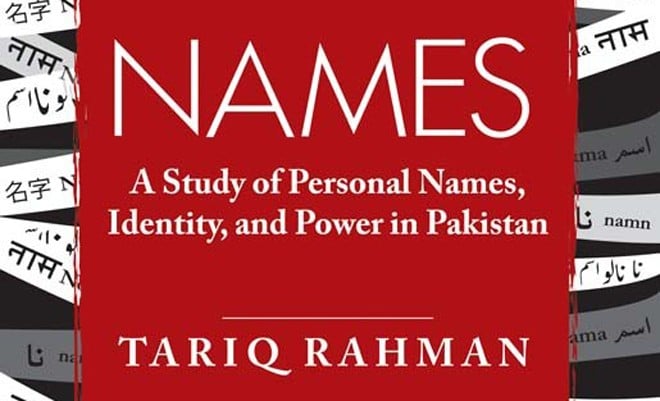
The first comprehensive and most readable onomastic study of its kind in the country

Dr Tariq Rahman is a scholar of no mean repute who has, over the years, penned some of the most authentic and erudite books on varied topics. These include his path-breaking books on language and its impact of identity etc. But the list of his books is long and one needs a whole dissertation to encapsulate his wonderful contributions to the academia as well as laymen like me.
Every once in a while, he dips deep into the sea of knowledge and comes up with a new gem of a book that gets etched on the memories of the readers. Names, A Study of Personal Names, Identity, and Power in Pakistan is his latest magnum opus that is already being avidly read and discussed among serious readers. Here we see him exploring a subject that has not been touched by any one before him. He seems to be at his best while dissecting the names, their underlying motives and also their allusion to certain religious or cultural symbols. So this is the first comprehensive onomastic study that has covered all the country, a study that would definitely prod other scholars into this area.
Dr Tariq Rahman starts off by how he drifted towards the subject and funnily states that since he does not play chess, this research is his substitute for chess. He rightly says that personal names are badges of group identity, indicators of lineage, socio economic class, and also the level of modernisation. Among the Muslims the names of Muhammad, Ali, Hussain, etc. are very common as they carry a certain religious sanctity and are reminiscent of the religious heritage. In other religions, other names are the carriers of religious symbols and identity.
Dr Rahman followed a systematic research pattern as he has collected data from all the areas of Pakistan -- rural as well as urban. A set of questions were also distributed among a group of people which they answered. He mentions that it was Richard Temple who wrote ‘Dissertation on the Proper Names of Punjabis’ (1883) which was based on the data gathered in Ambala district. He devoted a whole chapter to Muslim names. That study is hardly relevant today as the ground realities have undergone a huge change.
This gap is efficiently filled in Dr Rahman’s tome. Here and there, we find some refreshing as well as scholarly information churned out by the author: "In addition, certain names are categorised as ‘radical’. These are defined as those which are contingent upon the view that ‘West’ is hegemonic, exploitative, and anti-Muslim. Among these names are Saddam and Osama and some typically Arabic components of names not used in Pakistan in its early years. Saddam Hussain and Osama Bin Laden are seen in Pakistan to have stood up to Western bullying."
Each chapter is a treat but the chapter titled ‘Names, Power and Class’ is very thought provoking as here the author has shown how the class and identity are reflected in names. People of lower economic status are never called by their full names as we have witnessed in our society where servants are derogatively treated. Dr Tariq Rahman alludes to the fact that in Urdu literature, too, these people are harshly called by their nicknames that often border on the ridiculous. Here he mentions a story ‘Kafir’ by Ismat Chughtai when the Nawab calls her son by his full name. He mentions another story by Bano Qudsia in which the name of a village boy is degraded into a pejorative nickname of Baghi. But he assumes the respectful form of Hussain Ali Bagh on becoming a famous poet in England.
There are other engaging chapters which throw light on other aspects of names. The author has also discussed the impact of modernisation in a riveting chapter. As I have said earlier, it’s a book you will find it hard to put down once you pick it.
He concludes that naming practices in Pakistan’s modern society are related to perceptions of identity of various kinds. Certain names reflect class identity while others are correlated with ethnic identity. Urban naming reflects the desire to seek novelty without losing consciousness of meaning while in rural areas naming is by and by traditional with an aim that a name must have a meaning.